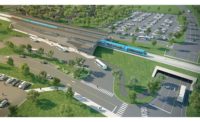Pierre Lavallee, new CEO of Canada Infrastructure Bank, is on the hunt for “transformative” projects for investment. The country’s quasi-public lender has zeroed in on about 10 contenders after fielding more than 55 proposals, he confirmed to ENR, declining to disclose their identities.
Formed in 2017 to leverage about $30 billion in government infrastructure funding to gain multiples of private funds in the next decade, the bank has made just one major investment—a $970-million secured loan to Montreal’s $4.7-billion light-rail system last summer. Major projects, such as access roads in Toronto to downtown subways, are among the ideas pitched to bank executives, say media reports.
“We have the means to make large investments. We are looking to have a material impact,” Lavallee told global project executives last month in Toronto at a Canadian public-private partnership conference. The bank is interested in projects with a strong revenue component, such as Ontario’s newly built Highway 407, but may also invest in projects with “shadow tolls, fees, fares, tariffs, and mechanisms based on appreciating land values,” Lavallee said in a statement. The bank also is considering ways to bundle smaller projects into a larger package that could attract investors.
“We believe that there is an appetite to invest in new infrastructure projects with a reasonable risk-reward equation for private and institutional investors,” said Lavallee, named to head the bank in May after a former role overseeing a team at the Canada Pension Plan Investment Board that managed $94 billion in assets. The bank is on track to have its executive team in place by the end of the year. On board this month is its head of project development, François Lecavalier, a former senior vice president at the Business Development Bank of Canada who managed a $600-million clean technology funding program.
Lavallee and bank executives have already been talking with investors in China, Japan, the U.S. and the U.K., with at least 120 meetings held. A top official of the Laborers’ International Union of North America has communicated to bank officials its interest in investing in Toronto transportation projects, according to the Daily Commercial News.
Azfar Ali Khan, a director of the Institute of Fiscal Studies and Democracy at the University of Ottawa, says that “doing business with the government on infrastructure projects, there is a lot of safety and stability with respect to the returns and not too much of a downside.”
But he and other observers also note rising cultural and political objection in Canada to more tolls and user fees to fund infrastructure there, as well as concerns related to foreign ownership of public assets and national security issues.



Post a comment to this article
Report Abusive Comment